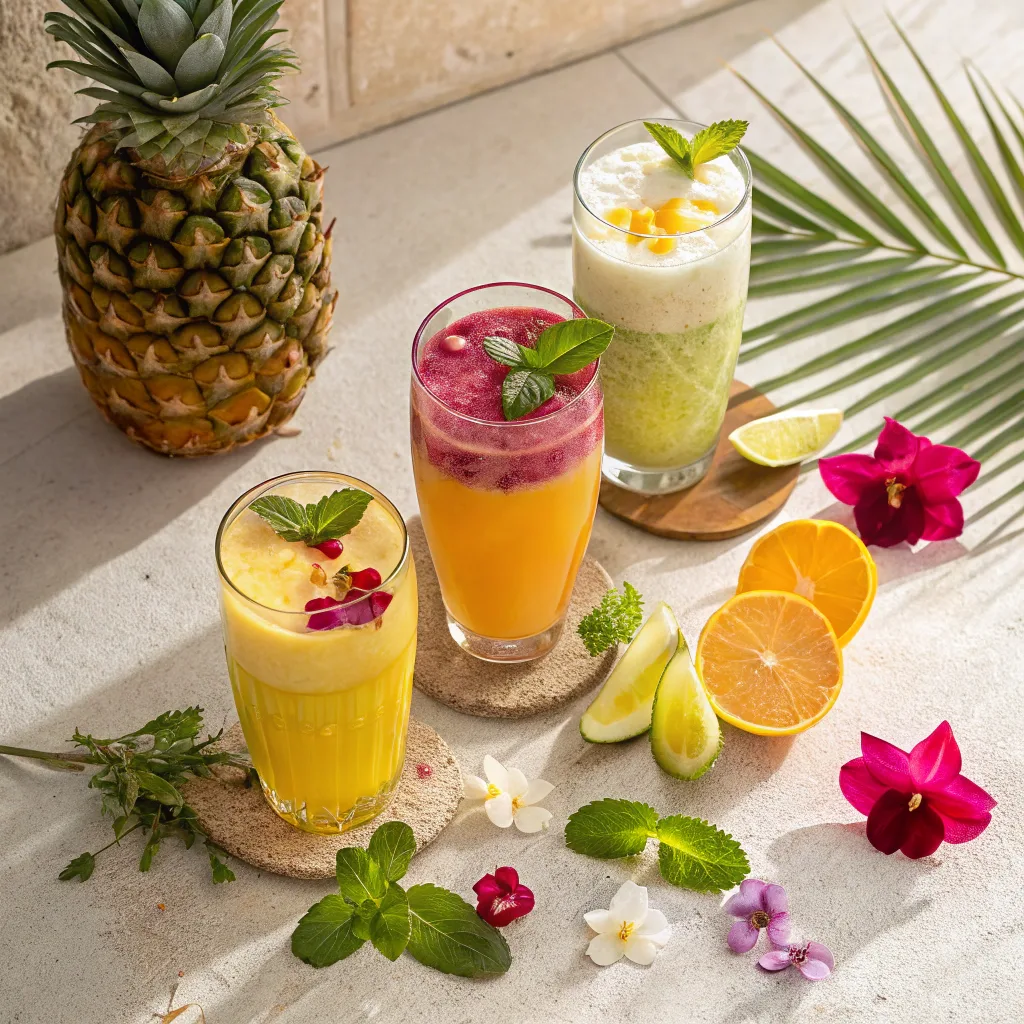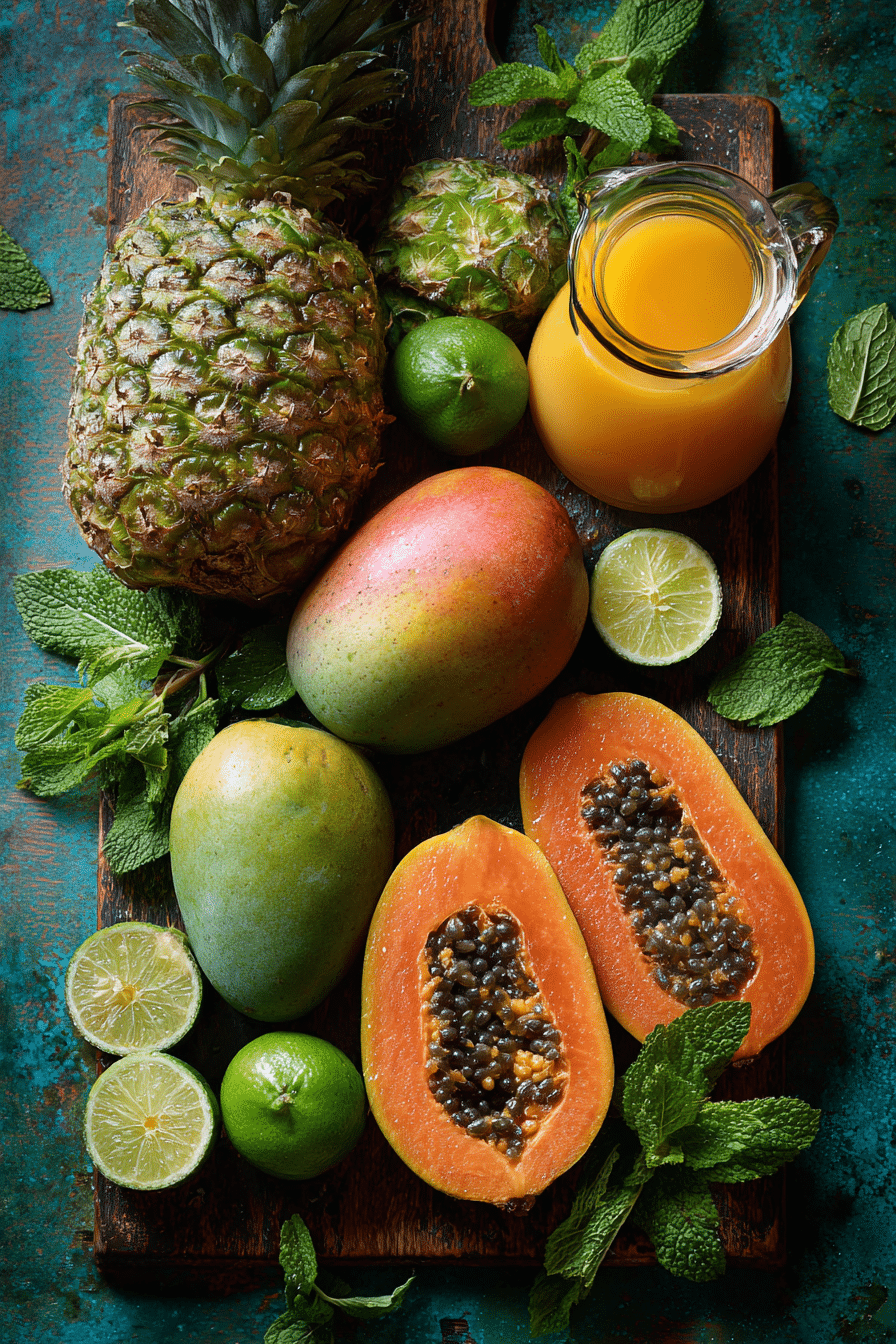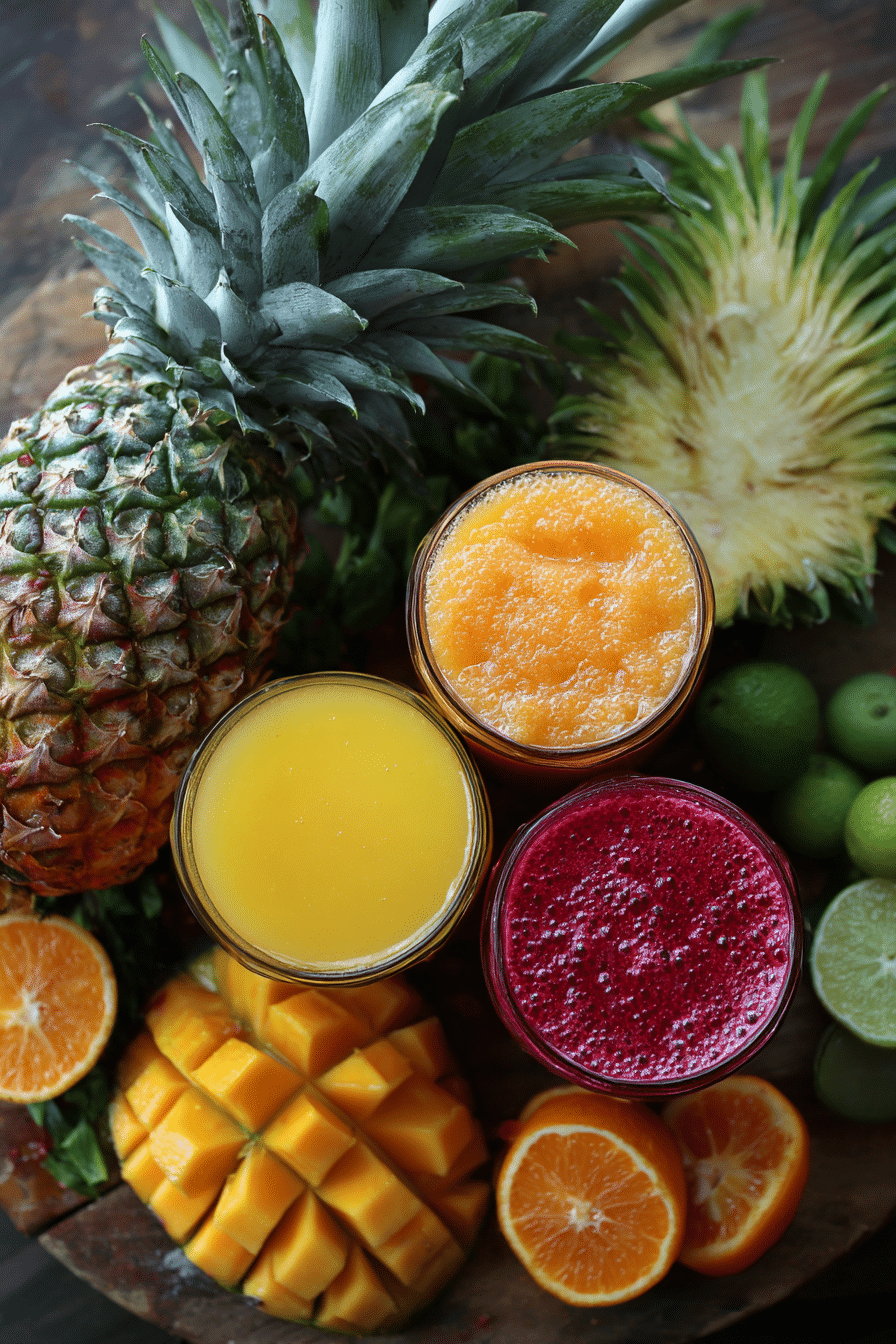There’s something about tropical fruit juices that instantly transports you to sunshine, palm trees, and a slower pace of life. The first sip is usually sweet, tangy, and layered with flavors you don’t get from regular apple or orange juice. For me, the memory goes back to a summer trip along the Maine coast when a local café handed me a glass of pineapple-mango juice with a sprig of mint.
It wasn’t just refreshing—it felt like vacation in a cup. That’s what makes tropical juices so special: they’re not just about quenching thirst, but about creating a mood and experience. In this article, we’ll look at the fruits that make up these juices, their health benefits, and how you can blend your own at home.
Table of Contents
tropical fruit juice
Equipment
- blender
- cutting board
- knife
- measuring cups
- serving glasses
Ingredients
- 1 cup fresh mango chunks
- 1 cup fresh pineapple chunks
- 1/2 cup passionfruit pulp or juice
- 1 cup cold coconut water or filtered water
- 1 tbsp honey or maple syrup (optional)
- 4–5 ice cubes
- 2 mint sprigs for garnish (optional)
Instructions
- Add mango, pineapple, and passionfruit pulp to a blender.
- Pour in cold coconut water and add honey or maple syrup, if using.
- Blend until completely smooth and creamy.
- Fill glasses with ice cubes and pour juice over top.
- Garnish with fresh mint if desired and serve immediately.
Notes
Nutrition
A Personal Memory with Tropical Fruit Juices
Tropical fruit juices have a way of tying flavor to memory. I remember hosting a garden party one July where the menu was simple, but the drinks were the star. Guests skipped wine in favor of tall glasses filled with papaya, guava, and orange juice mixed over ice. The colors glowed like a sunset, and the taste was bold yet balanced—sweet with a touch of tartness. That’s when I realized tropical fruit juices are more than beverages; they bring inclusivity and fun to gatherings because they appeal to everyone, drinkers and non-drinkers alike.
Why Tropical Juices Are Special
Unlike the single-note taste of traditional juices like apple or grape, tropical blends are complex. Mango offers a creamy sweetness, pineapple brings acidity, guava adds floral notes, and passionfruit delivers a punch of tartness. Together, they create a drink that feels layered and indulgent without alcohol. Across cultures, tropical juices are tied to celebration—think guava nectar in Caribbean kitchens or fresh coconut water at beachside stalls in Asia. They’ve long been a symbol of refreshment and joy, and now they’re increasingly popular in wellness circles for their nutrient-rich qualities.
What Makes Tropical Fruit Juices Unique
What Fruits Are in Tropical Juices?
Tropical fruit juices are rarely just one flavor; they’re usually a mix that captures the essence of warm climates. Pineapple and mango are two of the most common bases, often joined by guava, papaya, passionfruit, or orange for brightness. Some blends add lychee or dragonfruit for an exotic twist. In fact, when you sip something like a mango-pineapple juice, you’re tasting fruits that thrive in humid, sun-soaked regions where their natural sugars develop more intensely than in cooler climates.
If you’re curious about how pineapple pairs with citrus, the pineapple and orange juice blend is a perfect example of how tropical fruits create a naturally sweet yet tangy balance. And for those who love experimenting with mocktail bases, exploring tropical mocktail ingredients can open the door to endless variations of refreshing drinks at home.
Tropical Juice vs. Regular Juice
The main difference between tropical juices and standard fruit juices lies in complexity. Apple or grape juice usually has a single sweet note, while tropical juices deliver layers: sweet, tangy, sometimes even creamy. Nutritionally, tropical juices often provide higher amounts of vitamin C and antioxidants compared to traditional juices, though they can also be richer in natural sugars. Regular orange juice may feel familiar, but a tropical blend with mango and guava not only tastes brighter but also feels more indulgent. In many cuisines, tropical juices aren’t just breakfast staples—they’re served with meals, used in desserts, and even celebrated as festive drinks.
Health Benefits & Nutrition
Is Tropical Fruit Juice Good for You?
Yes—when enjoyed in moderation, tropical fruit juices can be very good for you. They’re naturally rich in vitamins like C and A, folate, potassium, and antioxidants that support your immune system and overall wellness. For instance, guava juice contains nearly four times the vitamin C of orange juice, while mango juice is high in beta-carotene, which your body converts to vitamin A. Pineapple juice contains bromelain, an enzyme that aids digestion and reduces inflammation.
Of course, not all juices are equal. Store-bought blends often have added sugar, which can reduce their health benefits. That’s why fresh-squeezed or homemade versions are a better option. For inspiration, you can try using guides like hydrating tropical mocktails to keep your drinks refreshing without unnecessary sweeteners. If you prefer a citrus-forward taste with less sugar, an orange mocktail recipe is another great starting point.
Boosting Wellness with Tropical Juices
Tropical fruit juices do more than refresh—they actively support your health. Mango and papaya juices are known to help with digestion thanks to natural enzymes, while passionfruit juice is rich in fiber, supporting gut health. Guava and pineapple juices provide antioxidants that may improve skin health and fight free radicals. Coconut water, often blended with these juices, is naturally hydrating and helps replenish electrolytes after exercise.
Here’s a quick look at how a few popular tropical juices compare nutritionally (values per 1 cup, approximate):
| Juice Type | Calories | Vitamin C (% DV) | Key Benefit |
|---|---|---|---|
| Pineapple | 130 | 131% | Digestive enzymes, hydration |
| Mango | 107 | 67% | Vitamin A for skin & eyes |
| Guava | 112 | 209% | High antioxidant boost |
With such variety, tropical fruit juices can easily become part of a balanced diet, especially when you pair them with lighter meals or use them as the base for healthier mocktails.
Tropical Fruit Juice Recipes & FAQs
Easy Homemade Tropical Juice Mixes
Making tropical fruit juices at home is easier than most people think. You can start with just a few fruits and a blender. A favorite combination is mango, pineapple, and passionfruit blended with cold water or coconut water.
For something tangier, try guava and lime with a touch of honey. If you’re in the mood for something that feels more festive, the tropical punch mocktail is a vibrant choice that layers sweet and citrusy flavors. And for a lighter option with a refreshing twist, a tropical sunrise mocktail recipe offers a bright blend that looks as stunning as it tastes.
Pairing Tropical Juices with Food
Tropical juices are versatile enough to complement a wide range of dishes. A mango-pineapple blend works beautifully with grilled fish, while guava juice pairs nicely with spicy dishes by cooling the palate. Papaya juice is a natural partner for brunch spreads, especially when served with fresh pastries or yogurt. For casual gatherings, try serving your tropical drinks alongside recipes like a bahama mama mocktail or even include them in your spread of mocktail recipes, so guests can mix and match to their taste.
FAQs about Tropical Fruit Juices
What juices are in tropical juice?
Tropical juice usually blends pineapple, mango, guava, papaya, and passionfruit. Some versions also add orange or lime for extra brightness.
What fruit is in a tropical drink?
It depends on the recipe, but tropical drinks often include pineapple, mango, and passionfruit as base flavors. Exotic options like lychee, dragonfruit, or coconut water are sometimes added for uniqueness.
Is tropical fruit juice good for you?
Yes, when made without added sugars, tropical juices provide vitamins, antioxidants, and hydration. They can support digestion, immunity, and skin health.
What type of fruit is tropical?
Tropical fruits grow in warm, humid climates near the equator. Common examples include mangoes, pineapples, bananas, guavas, papayas, and passionfruit.
Conclusion
Tropical fruit juices are more than just drinks—they’re experiences that bring color, nutrition, and refreshment to any table. Whether you enjoy them in their purest form or mix them into creative recipes, they offer a delicious way to connect with vibrant flavors from around the world. Next time you’re craving something refreshing, skip the usual orange juice and blend up a tropical mix—you’ll discover why these juices are cherished across cultures.





